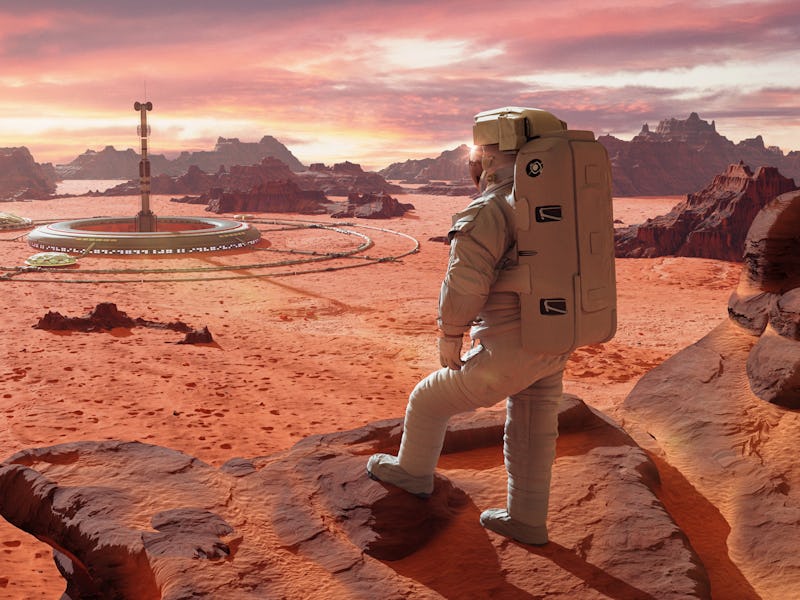SpaceX: Elon Musk reveals 'no chance' of city on Mars without this key change
The tech entrepreneur is concerned about the plan's chances.

A city on Mars may not materialize unless current technologies speed up in development, Elon Musk told an audience Monday in comments that represent a marked softening of expectations.
The SpaceX CEO has been pushing his teams to work on the Starship, a fully-reusable stainless steel ship that could transport up to 100 people or 100 tons at a time. The design could enable one of Musk's most radical ideas, to establish a city on Mars as early as 2050. SpaceX is building its manufacturing capabilities to produce up to 1,000 Starships, which would be used to transport up to one million tons to Mars.
But speaking at Satellite 2020 in Washington, D.C., Musk notably tempered expectations.
In a wide-ranging interview, where he also discussed the prospects for Starlink, Crew Dragon and Falcon 9, Musk stated that "if we don't improve our pace of innovation," he would not live to see the Mars city. He went as far as to say that, without improvement, it might not happen at all.
“The thing that concerns me the most right now is that unless we improve of rate of innovation dramatically, then there is no chance of a city on the face of the Moon or Mars,” Musk said. "This is my biggest concern."
It's a strong claim from Musk, who is otherwise famed for setting high expectations and motivating his teams. It comes as reports show SpaceX encountering issues during a Starship test, and suggests even the ambitious Musk has started to reassess the timeline for the company's most ambitious project.
Elon Musk.
Musk has previously struck a more optimistic tone, avoiding the chance to qualify his predictions with too much uncertainty. In a September 2016 event, Musk said that "it's probably somewhere between maybe 40 to 100 years to achieve a fully self-sustaining civilization on Mars." In September 2018, he wrote that a base on Mars could "probably" be built by 2028. In March 2019, he wrote on Twitter that "it’s possible to make a self-sustaining city on Mars by 2050, if we start in 5 years & take 10 orbital synchronizations."
But Musk has also stressed that the current chance to expand beyond Earth might not last forever. In December 2016, he declared it was "kind of amazing that this window of opportunity has opened for life to go beyond Earth, and we just don’t know how long that window’s going to be open."
The CEO is famed for his tight deadlines, even at SpaceX. Company president Gwynne Shotwell told CNBC in May 2018 that "there’s no question that Elon is very aggressive on his timelines, but frankly, that drives us to do things better and faster."
But there are signs that Starship's timeline may prove particularly tight. During an Ars Technica interview with Musk released this month, Musk described his frustration after the SN1 prototype exploded during a pressure test. He also compared the current ramp-up process, where SpaceX will build a Starship every 72 hours, as similar to the one Tesla experienced for the Model 3.
Tesla's ramp-up was not a pretty experience. When the Model 3 started production in July 2017, Tesla only made around 1,000 Model S and X vehicles per week. Musk tasked the team with reaching a production rate of 5,000 Model 3s per week, a period he described as "production hell." Musk spent nights sleeping at the factory to help meet these goals, and he went on to describe it in hindsight as a "bet the company" moment. Musk had suggested at the production start event that Tesla could produce 5,000 per week by December 2017, but Tesla instead reached its goal 12 months after the start of production.
During Monday's interview, Musk also explained the role of Starlink, SpaceX's fledgling satellite internet constellation. He explained it was "not some super threat to telcos," and its target audience was "the three-to-four percent hardest-to-reach customers." Musk has previously described Starlink as integral to Starship's success due to its money-making potential, and Starship integral to Starlink due to its large potential for space launches.
SpaceX's Starlink.
The Inverse analysis
Planning for a city on Mars, before any humans have ever set foot on the planet, feels like the definition of running before you can walk. But for the typically ambitious Musk, it feels like par for the course. This is the same guy that's set tough goals for full autonomous driving, electric vehicle production, and rocket reusability.
The city on Mars indeed may not arrive in Musk's lifetime, but the stretch goal could lead to some impressive milestones along the way. It could mean landing people on Mars, creating the most powerful rocket ever, making spaceflight more commonplace and opening up space to the broader industry.
But when Musk suggests a city on Mars may not be possible at the current rate, it does suggest the long-shot goal may be a lot, even for an entrepreneur famed for his long shots.